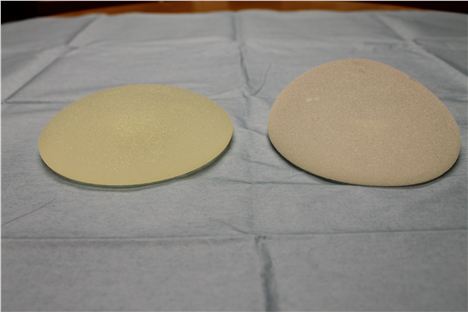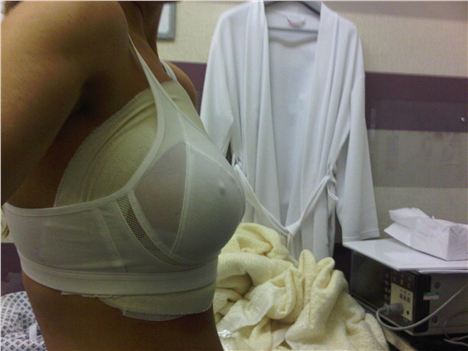BOOBS became huge in the nineties.
It was silicone sister Pamela Anderson who triggered the craze. Her slow-motion, red costume-encased breasts were the focal point of Baywatch - the most popular programme in TV history according to the Guinness Book of World Records.
I can’t tell the difference between medical grade and non-medical grade silicone – it all looks the same. You rely on the governing body to give you that information.
And it was from those opening credits that the airbag generation was born, moving up cup sizes on their lunch breaks. Breast augmentation surgery was quicker, cheaper and safer.
That was until 2010 when the Medical and Healthcare products Regulatory Agency (MHRA) published a warning about a particular type of breast implant, advising ‘breast implant surgeons not to use silicone gel-filled breast implants manufactured by the French company Poly Implant Prothese (PIP).’
 Pamela Anderson - Boob Job Icon
Pamela Anderson - Boob Job Icon
The Story
The PIP factory in France was swiftly shut down and their products banned after it was found they had used the chemicals Baysilone, Silopren and Rhodorsil in their implants - more commonly used as fuel additives or in the manufacture of industrial rubber tubing, believe it or not.
With an estimated 30,000–40,000 women in the UK held hostage by the implants in their own bodies, concern quickly turned to the moral obligation of both the NHS and private clinics to remove and replace the implants now dubbed ‘time bombs’ due to the increased chances of rupture.
One such vanity victim was TOWIE socialite, Penelope Cheshire, who underwent breast augmentation surgery four years ago at Profile Cosmetics on Harley Street in London.
She said: “After the story broke and I found out I had PIP implants my immediate reaction was ‘get them out’. I contacted Profile Cosmetics and they weren’t interested. They made me feel like I wasn’t worth talking to and that I should just deal with it. I didn’t want to go out, I didn’t want my boyfriend to touch me and I was even worried about my dogs jumping up at me. Profile said they’d write me a letter with all the details of my implants but I haven’t heard from them since and I’ve been ringing twice a day and emailing them.”
So far, Profile Cosmetics has also failed to respond to requests to contact Body Confidential.
 Towie Socialite Penelope Cheshire With Pip Implants
Towie Socialite Penelope Cheshire With Pip Implants
The Shame
Penelope, like many other women in the same predicament, looked into her options but soon discovered even her own GP was unsure of the procedure for patients requesting removal purely for peace of mind.
In the end she turned to Castlefield Clinic in Manchester to have her PIP implants removed for free, before paying cost price (£4,500) for them to be replaced with Nagor implants.
Nishant Agarwal, Managing Director at Castlefield Clinic said: “We’re currently dealing with 40-50 calls a day. There have been so many stories of people not being able to get help, advice or even find out what implants they’ve got inside their bodies.
“One patient told me they tried to call the clinic where they had their PIP implants put in and the voicemail said ‘If you’re ringing up about facelifts, nose reshaping or liposuction, please leave a message and someone will get back to you. If you’re calling about the PIP implants scare, please note no one from this clinic will call you back.’ I find that crazy. Absolutely shocking.”
Clinics under examination for being less than receptive include national companies Harley Street Medical Group and Transform. We contacted Harley Street Medical Group and were told they’d “rather find solutions for their patients than engage with the media” before being directed to the statement on their website here which includes plenty of apologies and conditions as to the circumstances in which they will remove them for free. Peace of mind certainly isn’t one of them.
 PIP implant left, Nagor implant right
PIP implant left, Nagor implant right
Big boobs have meant big business for such companies over the years, but with a crisis such as this it also has the potential to lead to big losses. Mammoth sized ones in fact – little wonder why some clinics daren’t pick up their phones.
Nishant said: “I absolutely feel for the bigger companies that have done say 10,000 PIP implants. I do see that side of the argument. Harley Street Medical Group gave an estimate that it would cost them £8m to remove and replace all the PIP implants they put in. That would put them out of business.
“These clinics didn’t know that what was inside the PIP implants was dodgy. However, what they could have known was that it was not high quality. That, for me, is where the sympathy ends.
“Patients are now up in arms because they were charged a premium rate for implants that are actually quite cheap. Penelope paid £4,700 for her PIP implants. This is more than the Nagor replacements we gave her and they are worth eight times the amount of PIP.”
The Blame
As unjust as it may seem to some, there isn’t actually a legal obligation to remove and replace implants for free by clinics because at the time, PIP implants were approved for use by the MHRA for quality.
Nishant said: “I can’t tell the difference between medical grade and non-medical grade silicone – it all looks the same. You rely on the governing body to give you that information. That’s where the argument has been about a moral obligation rather than a legal one.
“It’s also important to remember that it’s a handful of clinics that aren’t responding and there are responsible clinics out there that did use the implants but are now facing their responsibility and at least speaking to people on the phone.”
This week, the British Association of Aesthetic Plastic Surgeons (Baaps) has placed the broader blame on advertising.
Fazel Fatah, president of Baaps, told the BBC: "Aggressive marketing gimmicks...not only trivialise surgery but endanger the patient. In no other area of surgery would one encounter Christmas vouchers and two-for-one offers - the pendulum has swung too far, and it is time for change."
 This Promotional Email From Groupon Was Banned By The ASA
This Promotional Email From Groupon Was Banned By The ASA
However it’s arguable that it’s the patients, not the clinics, who need to remain the focus of this scandal. Vulnerable patients in particular need to be better educated, informed and thoroughly assessed before undergoing any type of cosmetic surgery. What some describe as a ‘knee-jerk ban’ on advertising arguably draws attention away from the real psychological reasons some women are drawn to cosmetic surgery in the first place, adverts or no adverts.
Penelope’s own experience has made her question her reasons for going under the knife.
She said: “I was 25. I think when you’re younger you haven’t got a lot of life experience and you’re naive. Magazines and adverts can definitely sway you. The reason I wanted a boob job was because a lot of my friends were models and in the public eye with perfect boob shape. I was a 34C at the time so it wasn’t as though I was flat chested. I’m a 34D now but £10,000 in four years is a lot to spend on my body.
“There should be some kind of regulation and support for young women getting surgery to save them regretting it further down the line or dealing with the consequences. Obviously it’s my own fault. I don’t expect people to feel sorry for me but I just think sometimes your head isn’t in the right place when you get this stuff done.”
 Penelope Cheshire's New Nagor Implants
Penelope Cheshire's New Nagor Implants
The End?
Whether breast augmentation is defined as a vanity project for the Pammies of this world or an attempt to boost one’s underlying self esteem issues, it appears the most important factor for the Government is to make sure PIP-gate never happens again.
This week Lord Howe, the Minister for Quality, said: “Women with PIP implants are, quite rightly, very concerned. We need to give them answers and set out lessons for the future.”
One such answer many women are waiting for is whether the Government will be able to force private clinics to step up. Or if in the end, the NHS will have to come to their rescue. The latter is likely to leave a bad taste in the mouths of many taxpayers and those on NHS waiting lists for other health problems.
Nishant concluded: “There is clear guidance now for GPs about what to do. If they do suspect a rupture, localised pain or steady burning sensation, that should trigger the need for further investigation for them and the patient would be allowed to have a scan on the NHS.
“If there hasn’t been a rupture, at the moment GPs can’t send women for routine scans on the NHS for free. The issue becomes cloudy when people want them removed as a preventative measure. It’s the moral and legal obligation debate again. The Department Of Health are sticking with their guidance that there is no evidence linking a possible rupture and ill health. So there is no advice to suggest the routine removal of implants if you’ve got them in.
“My personal opinion is that 40,000 women shouldn’t be suffering in vain. If you’re worried about something, act on it. Speak to someone reputable and get advice, find out what your options are. And for the providers, this scandal is separating the wheat from the chaff.”
There are currently Government calls for private clinics to be forced to pick up the costs for removal of PIP implants as well as the creation of a nationwide register of implants for the future.
Penelope concluded: “It’s been kept a secret for a long time but now everyone knows that certain surgeries are using cheap crap meant for industrial use. I couldn’t look at them after the doctor took them out. It made me feel queasy that they were in my body.”
“There’s no structure in place for cosmetic surgery regulation and everyone is avoiding the issue. Until the Government makes a decision, a lot of other women won’t know where they stand either. I’ll be keeping a close eye on the new implants and I’ll be contacting Profile to get my money back.”
On Thursday 26 January, Poly Implant Prothese (PIP) founder Jean-Claude Mas, 72, was arrested in France. Mas has been under investigation since he revealed in a police interview last year that PIP ordered employees to hide the unauthorised silicone when they visited its factory. He also said he had "nothing" to say to women facing surgery for their removal and that victims had only filed complaints "to make money" according to the BBC.
If anything is to be learnt, it’s that regulation is key and 2012 is the year of open debate about the regulation of cosmetic surgery. Jean-Claude Mas is clearly an unbalanced character – a modern-day Victor Frankenstein.
His arrest, along with PIP Facebook groups to unite women, protests all over the country and the ongoing debate from the Department of Health, shows the social obsession with breast size has just turned a whole new corner.
Up until now, boobs jobs were fast becoming as mainstream as makeup, with Jean-Claude Mas appearing to consider his abomination about as detrimental as lipstick on teeth.
And that's a very scary thought.
Follow Lynda on Twitter @LyndaMoyo




